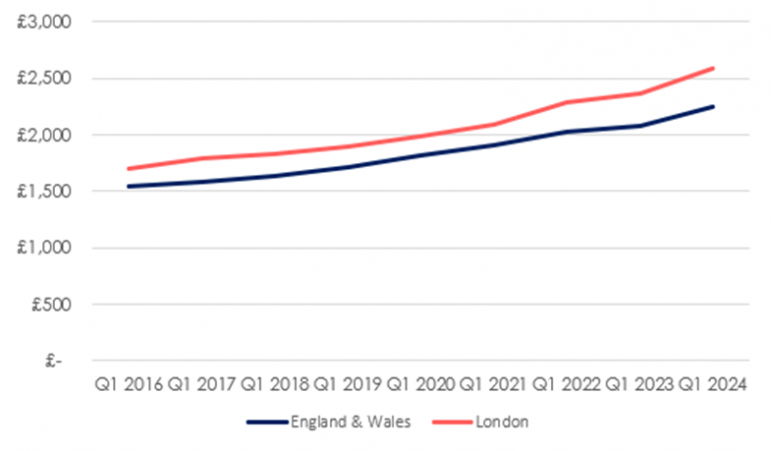 The average annual service charge for flats in England and Wales increased by 8.4% or £175 between Q1 2023 and Q1 2024 to stand at £2,247, the latest Hamptons Service Charge Index shows.
The average annual service charge for flats in England and Wales increased by 8.4% or £175 between Q1 2023 and Q1 2024 to stand at £2,247, the latest Hamptons Service Charge Index shows.
Average service charges in five of the 10 regions across England and Wales are above £2,000 per year.
The number of flats with a service charge of less than £1,000 is on course to reach zero within 10 years.
Rising numbers of first-time buyers are paying service charges, accounting for a record 36% of flat purchasers in Q1 2024. First-time buyers overtook landlords in 2016.
Share of flats with a sub £1,000 annual service charge in England & Wales
Source: Hamptons
Inflation of goods and services has pushed up service charge costs for leaseholders across England & Wales. Hamptons’ annual service charge index reveals that the average flat service charge increased by 8.4% or £175 a year between Q1 2023 and Q1 2024 (chart 3), more than twice the rate of inflation and marked the fastest rate of annual growth since our records began in 2016. At the end of Q1 2024, the average service charge on a flat stood at £2,247 per annum, 31% higher than in Q1 2019.
Service charges are typically set on estimated costs, so when inflation pushes costs upwards, the impact on service charges tends to be delayed.
By the end of Q1 2024, 19% of flats had a service charge below £1,000 per year, a figure which has fallen annually from 33% in 2016. In London, just 14% of flats have an annual service charge below £1,000. Based on their current trajectory, there are unlikely to be any flats offering a sub £1,000 per year service charge within a decade.
Average annual service charge bill (England & Wales)
Source: Hamptons
The service charge for a one-bed flat in England and Wales averaged £1,940 at the end of Q1 2024, with 75% of leaseholders paying more than £1,000 per annum. Meanwhile, the average service charge for a two-bed was £2,311 with 84% paying more than £1,000 a year. And the average three-bed stood at £3,044, the first time the annual charge has crossed the £3,000 mark (chart 2). 89% of three-bed leaseholders are paying more than £1,000 per year.
Average service charges in five of the 10 regions across England and Wales are now above £2,000 per year, while five years ago in 2019 no region had average service charges at this level. 81% of changes to service charge bills in the year to Q1 2024 moved in an upward direction. Around 5% of leaseholders now pay more than £5,000 per year.
Average annual service charge bill for a flat
Source: Hamptons
The average annual service charge in the capital is now £2,581 which represents an increase of 9.0% over the last 12 months (chart 3). Service charges in London are higher than anywhere else in the country. This reflects the higher cost of living in the capital and the fact that larger more complex city buildings tend to come with higher running costs over their lifetime.
First-time buyers are becoming more exposed to rising service charges since they are now purchasing the largest share of flats since 2015 when our records began. This comes as they downsize their first home expectations in the face of higher mortgage rates. A record 36% of flats were bought by a first-time buyer in Q1 2024. This means a rising share of new buyers are paying service charges on top of their mortgage. In some cases, this will reduce the amount they can borrow.
First-time buyers overtook landlords in 2016 as the second-largest group of apartment purchasers. If current trends continue (which will probably be determined by the level at which interest rates settle), they will overtake movers (currently 47% of all flat buyers) as the largest buyers of flats in 2026.
Flat buyers
Source: Hamptons
David Fell, lead analyst at Hamptons, said: “Rising service charges mean buyers are increasingly wary of the additional ongoing cost to their home purchase and are carefully weighing up the value for money they offer. Higher mortgage rates have already financially squeezed many would-be flat buyers, and with more taking on service charges as well, it’s often limiting how much they are able to borrow from the bank.
“With buyers going through service charge accounts with an increasingly fine toothcomb, they’re more informed than ever about how much they’ll be paying each month and what they’ll be getting back. This means the value of flats where the service charge is disproportionate to the services on offer has come under downward pressure.
“Service charges are usually based on forecasted running costs for the year ahead. But inflation has been pushing these costs above what was pencilled in, meaning today’s higher bills reflect inflation which has been running hot for much of the last 18 months. Alongside this, the first generation of city centre flats are now thirty years old and are starting to show their age, often approaching the point when they need an injection of cash.”






As a freehold only buyer these charges are shocking , £2k to have your 2 bed insured and hall way polished-god forbid if you have a lift.
You must be logged in to like or dislike this comments.
Click to login
Don't have an account? Click here to register
Ah! The dual benefits of runaway inflation for 18 months and the dreaded “B” word (no, I refuse to type it in full).
Insurance companies have significantly raised their premiums, across the board. The cost of my car insurance, my contents insurance, my buildings insurance, my travel insurance have all skyrocketed.
Then, as an unintended consequence of “B”, the cost of cleaners, gardeners, general handymen, and such has also increased significantly.
Then, of course, the cost of materials has gone through the roof, partly due to simple scarcity and partly to general inflation.
RPI index January 2020 was 290.6. March 2024 it was 383.0. That means that (on average) EVERYTHING we buy is at least 32% more expensive in just 4 years.
To put that into context, that’s roughly the same rise in just 4 years as happened in the previous 11 years!!!
So, of course everything is more expensive, scarily so.
You must be logged in to like or dislike this comments.
Click to login
Don't have an account? Click here to register
The English share of freehold, freehold, and leasehold system is nothing short of a cunning scheme concocted by the lords during the colonial era. This antiquated system, which continues to prevail deserves an immediate abolition.
One victim of this nefarious scheme is a resident in Kensington who had the guts to question the management regarding the abysmal lack of service and the ever-increasing service charges of £25K per year. However, instead of addressing the concerns raised, he was met with an eviction notice and an injunction forbidding him from speaking out against the rogue non-dom management.
What’s even more appalling is the staggering revelation that the management has squandered a jaw-dropping £2.5 million on 4 years of legal costs in a relentless pursuit to recover a measly £354 from him in interest.
This brazen misuse of funds serves only to shield themselves from the law while shamelessly lining their pockets with the hard-earned money of absentee residents, all intended for the well-being of an iconic historical building.
The time has come to expose this scandalous injustice and demand accountability from those responsible. The exploitation of residents must end, and the archaic share of the freehold system must be abolished once and for all!”
You must be logged in to like or dislike this comments.
Click to login
Don't have an account? Click here to register